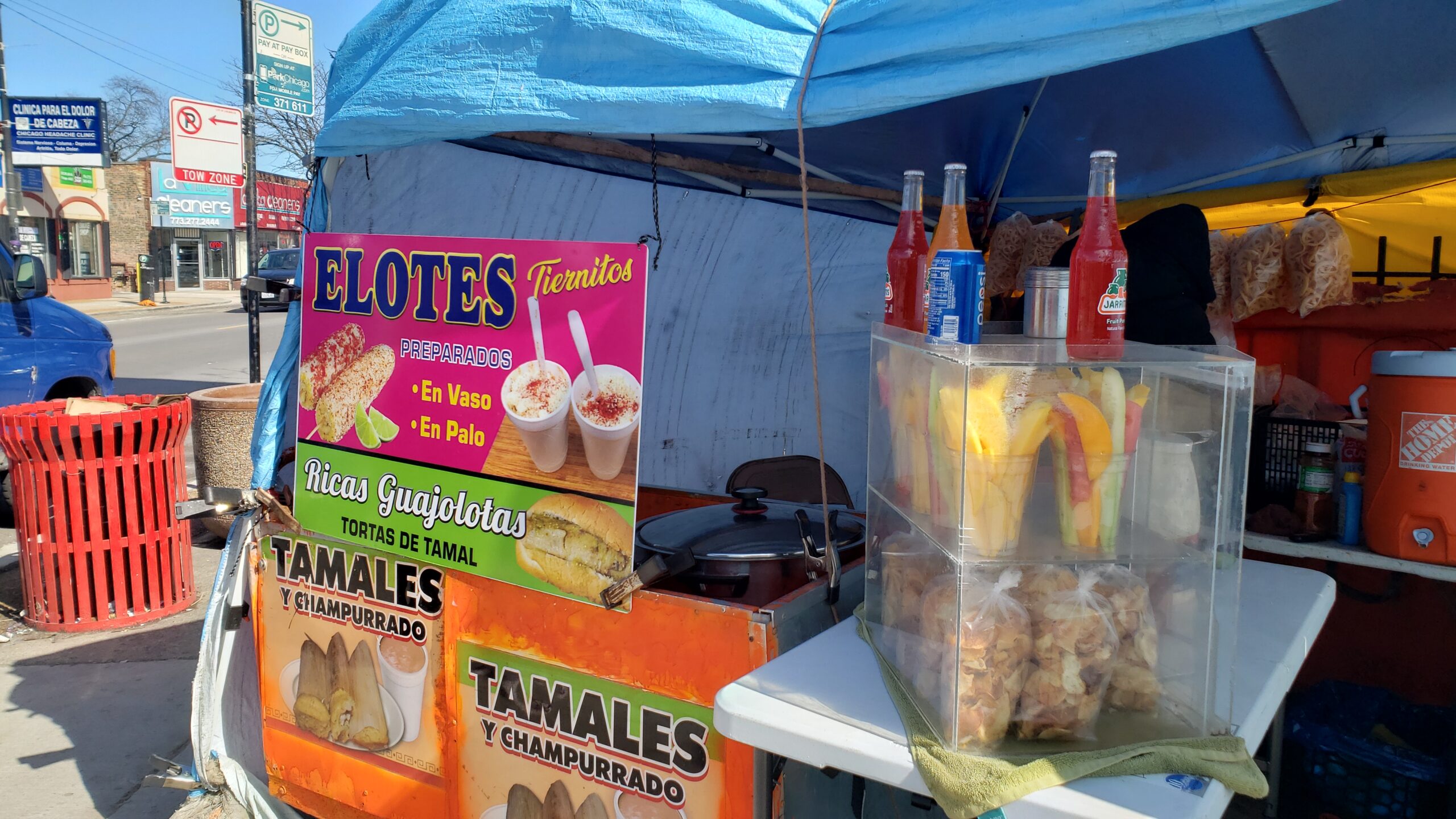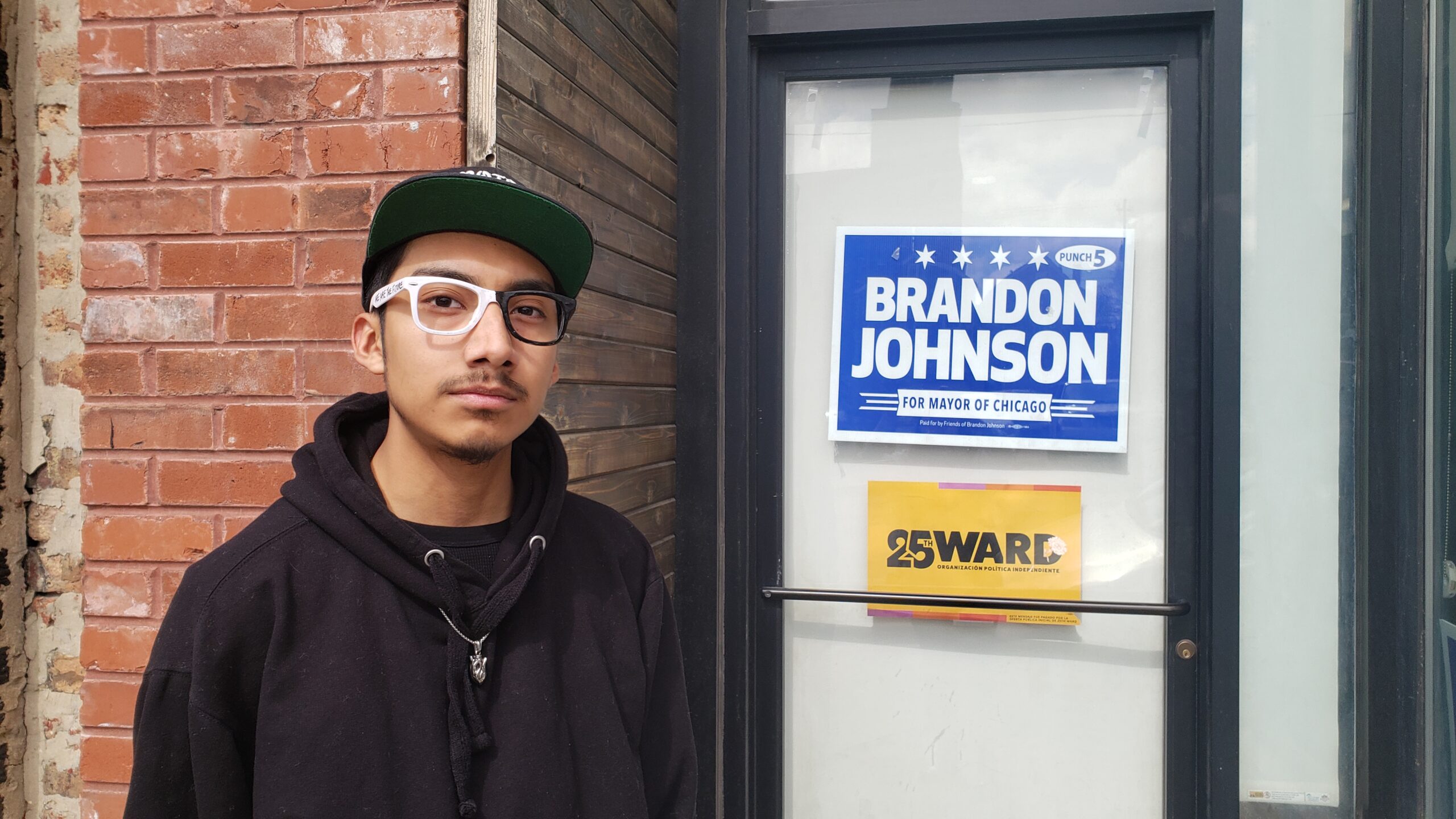Alexandria Imani Burgos would have turned 27 this month. But on October 19, 2014, the aspiring social worker went to pick up her younger brother from a friend’s house. As she waited inside, a stray bullet entered the home, killing her. She was only 18.
At a mayoral candidate forum this March, Alexandria’s father, Rafael Burgos, stood up and interrupted the moderators to ask a question. His daughter, he said, was murdered — and her case remains unsolved. The priority for the next mayor, he said, should be making Chicago safer.
Candidate Brandon Johnson agreed. “It pains me that we have families and parents who are burying their children,” he said. “I worry about it every single day.”
After the forum, held at the Chicago History Museum by a coalition of 17 organizations that serve the Black and Latino communities, Burgos found candidate Paul Vallas and reiterated his message. Vallas referred to a plan he had shared with the audience, but that left Burgos unsatisfied. Ultimately, he said, neither candidate offered a direct plan of action to immediately reduce the violence hurting Chicagoans.
Like others in their community, Burgos and Alexandria’s mother, Milagros Burgos, are still deciding whether to cast their votes for former Chicago Public Schools CEO Vallas or Cook County Commissioner Johnson in the runoff election on April 4. The Trace spoke with 10 Latino voters, who told us the one thing they knew for certain is that the toll of gun violence is coloring their decision-making: In 2022, over 3,500 people were shot in Chicago, according to the City of Chicago’s Violence Reduction Dashboard. Eighteen percent of those shot were Latino.

Capturing the Latino vote is especially important to the runoff candidates because, in the February primary election, most of the Latino vote went to Jesús “Chuy” García. With García off the ballot, those votes are now up for grabs. Though Chicago’s Latino community turned out in relatively low numbers the first time around, they still make up almost a third of Chicago’s population, and they are disproportionately impacted by gun violence. Even so, many say they don’t feel their interests are represented by their leaders and that they’re being left out of the conversation on how to fix the problem.
For Milagros Burgos, the stakes are high. She thinks her daughter’s death was preventable, and often reflects on Alexandria’s contagious smile and desire to improve the world. She wants to prevent other parents from carrying the trauma that now burdens her and Rafael. “It’s not the wrong place at the wrong time,” she said. “We should go wherever we want to go without having that fear of being shot.”
Low Voter Turnout Among Latinos
The most striking differences between Vallas and Johnson are their approaches toward public safety. Some Latino voters are leaning toward Vallas because of his promise to hire more police officers and his statements on taking a “more aggressive” approach to prosecuting those who break the law. Others favor Johnson because of his pledge to reallocate police funding toward issues like housing, mental health, and job creation. Both candidates face the tall task of convincing Latino voters that they are sincere in their promises to urgently address the gun violence crisis.
For Roberto Valdez Jr., the midwest director for policy at the Hispanic Federation, the issue hits close to home. Gun deaths among Latinos nationally, he said, have increased at almost twice the rate of gun deaths overall. Though the number fluctuates on a daily basis, there are early signs that slightly more Latinos are being shot in Chicago this year than they were last year.
“The issue of gun violence is not just this idea of removing guns from communities or creating laws that ban assault weapons,” Valdez said. It’s also, “understanding that the issue of crime and gun violence is the disinvestment in communities of color.”
Those who live in the community know the impact gun violence has on all residents, said Vince Castillas, a political consultant who lives in Pilsen. After the forum, he said he was disappointed that candidates didn’t bring up the recent armed assaults that street vendors have been facing. These workers make Chicago feel more like home to working-class immigrants who depend on their services at times when many stores are closed. “A lot of these candidates don’t have a pulse on the community,” he said.
Castillas said he appreciated Vallas’ pledge to bring people who understand the Latino community into his administration. But that wasn’t enough to secure his vote — as of March 20, he was still undecided.
Because of their age or documentation, only 73 percent of Chicago’s Latino residents are eligible to vote. But many who were eligible didn’t come out to the polls during the general election in February. Latino-majority wards had a lower voter turnout rate of 31.07 percent than the city average of 35.85 percent.
Rafael Burgos, a resident of Jefferson Park, said people lose hope in the electoral process, and don’t vote because they don’t think it’s going to make a difference. “There is hope in this city,” he said. “But it has to be a priority because I’m sick and tired of seeing the devastation.”
During the February election, of the city’s 14 Latino-majority wards, García won six, Vallas won five, and Johnson won three.
No matter the results, Valdez said, both runoff candidates should invest in culturally competent outreach.
“Latinos are not monolithic,” Valdez said. “There are different cultures within the Latino umbrella.” It’s not enough to just translate campaign materials, he said — it’s also important to understand whom you’re speaking to, the generational differences between parents and their children, and the issues specific people care about most.
Even after a mayor takes office, Burgos noted, voters have to hold them accountable and make sure they are serving the community’s needs: “In four years from now, if it’s (public safety) still even worse than it is [now], then throw them out.”
A Difference in Opinion Among Latinos
For almost a year, street vendors in neighborhoods like Little Village have been asking the city for help against a growing number of armed assaults.
Juan Lorenzo, 56, has sold elotes and tamales on 26th street for more than 40 years. It wasn’t until last year, he said, that armed robberies became a problem among the vendors, who often work early in the morning and late into the night.

“Just imagine, you stay up late to prepare your items and come to sell, just so a person with a gun can come and take all of your earnings,” Lorenzo said in Spanish.
The job provides work to people who often can’t support themselves in other ways, especially if they’re undocumented, making it a financial bedrock of the community. What Lorenzo and other vendors want is more protection. He said more police should watch the area, especially during those vulnerable hours. At the same time, there needs to be an understanding that the police won’t harass the vendors, some of whom don’t have licenses to sell their goods.
Lorenzo worries that the city has become too soft on those committing crimes against the vendors, and feels that there is no fear of consequences. Vendors are especially concerned about resisting young assailants, he said, because they might be reckless enough to actually fire their weapons. And so far, he said, he wouldn’t be confident in any mayoral candidate, because no elected officials have done anything to help.
William Guerrero, a 21-year-old Pilsen resident and an organizer for Johnson’s campaign, wants a mayor who will prioritize the root causes of gun violence. He said he worries that adding police presence would increase the racial profiling young people like him already experience.

“I’m tired of the politics,” Guerrero said. “I don’t want to be a statistic to you. I want to be someone that you care about, because at the end of the day, I have a life, my homies have a life, my teachers, my brothers, my sisters, my father, everyone has a life.”
Ricardo Islas, 53, grew up under a military dictatorship in South America and knows the perils of a police state firsthand. But the Ashburn resident said that not holding people who are committing crimes accountable is also dangerous. “We need to find something in between that makes sense,” he said. He wants a mayor who will invest in long-term solutions while also prioritizing shorter-term ways to protect communities — which he said should include increasing police presence. He sees Vallas as the only candidate who plans to tackle gun violence on both fronts.
Last summer, a stray bullet went through Islas’s window and landed on the kitchen table; just a few hours earlier, his wife and daughter had been eating dinner right there. Since then, he said, they’ve abandoned the dining room. Now, they eat separately in their own rooms.
“The violence, in general, not just in the Latino community, must be attacked through several angles at the same time,” Islas said in Spanish. “I don’t think there’s just one magical solution.”

